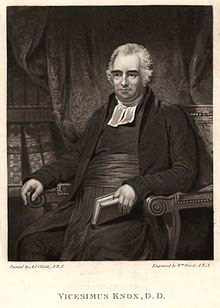Regency Personalities Series-Vicesimus Knox
Regency Personalities Series
In my attempts to provide us with the details of the Regency (I include those who were born before 1811 and who died after 1795), today I continue with one of the many period notables.
Vicesimus Knox
December 8, 1752 – 1821

Vicesimus Knox
Vicesimus Knox was born at Newington Green, Middlesex, the son of Vicesimus Knox (1729–1780), a cleric and schoolmaster, and his wife Ann Wall, daughter of Devereux Wall. He was educated at St John’s College, Oxford, matriculating in 1771 graduating in 1775. Meanwhile, his father became headmaster of Tonbridge School in 1772. Knox became a Fellow of his college, and was ordained by Robert Lowth, becoming deacon in 1775 and priest in 1776.
Knox replaced his father, who was in poor health, as headmaster of Tonbridge School in 1778. He was successful in raising the number of pupils, from around 20 to around 80. Among Knox’s students were Charles Girdlestone and John Mitford.
During the 1790s Knox was critical of British foreign policy, towards France and Poland, in articles written for the Morning Chronicle. The pupil numbers at the school fell back again, after his unpopular views became known.
Knox accumulated some livings: Shipborne (1800, a chapelry, as bequest from William Holles Vane, 2nd Viscount Vane), Ramsden Crays (1801), and Runwell (1807). But he did not become vicar of Tonbridge when the incumbent Henry Harpur died in 1790, the advowson passing out of the Vane family (to David Papillon), and John Rawstorn Papillon being appointed. Theophilus Lindsey had an account from Henry Austen of West Wickham of Knox acting as stand-in after Harpur’s death, as a showy preacher who made pointed remarks about Unitarians that Austen took personally.
As an essayist Knox wrote extensively on morals and literature, and as a minister he preached often on behalf of philanthropic causes and against war.
Knox argued that
“If the Christian religion in all its purity, and in its full force, were suffered to prevail universally, the sword of offensive war must be sheathed for ever, and the din of arms would at last be silenced in perpetual peace”.
and that
“The total abolition of war, and the establishment of perpetual and universal peace, appear to me to be of more consequence than any thing ever achieved, or even attempted, by mere mortal man, since the creation”.
Knox’s Essays Moral and Literary, Volume II, contains Essay XVIII “On Novel Reading”, which begins “If it is true, that the present age is more corrupt than the preceding, the great multiplication of Novels probably contributes to its degeneracy.” He considered that contact with Gil Blas or Devil Upon Two Sticks, picaresque novels by Alain-René Lesage, could cause a schoolboy to lose the taste for Latin classics.
The sentimental novel was explicitly linked by Knox to solitary vice. An early critic of Laurence Sterne, he took issue with the morality of A Sentimental Journey Through France and Italy. He complained that Sterne and Elizabeth Draper, of Journal to Eliza, had too many imitators. Winter Evenings has a story of Belinda who was too fond of “pathetic” novels. Knox approved of travel writing.
Knox wrote:
Essays Moral and Literary, anon. London
Liberal Education, or a Practical Treatise on the Methods of acquiring Useful and Polite Learning, Lond.
Elegant Extracts, or Useful and Entertaining Passages in Prose, selected for the improvement of Scholars at Classical and other Schools in the Art of Speaking, in Reading, Thinking, Composing, and in the Conduct of Life, anon. Lond.
Winter Evenings, or Lucubrations on Life and Letters, anon. Lond.
Elegant Extracts, or Useful and Entertaining Pieces of Poetry, selected for the improvement of Youth, anon. London 1789; other editions, anon. Lond.
The Poetical Epitome, or Elegant Extracts abridged, anon. London
Elegant Epistles, or a copious Collection of Familiar and Amusing Letters, selected for the improvement of young Persons, and for general Entertainment, Lond.
Family Lectures, or Domestic Divinity; being a copious Collection of Sermons, selected from … Divines of the present century, for the Use of Schools, London
Sermons, chiefly intended to promote Faith, Hope, and Charity, London 1792; 2nd edition, corrected, London 1793.
Personal Nobility, or Letters to a young Nobleman on the Conduct of his Studies and the Dignity of the Peerage, anon. Lond.
Antipolemus, or the Plea of Reason, Religion, and Humanity against War; a Fragment, translated from Erasmus and addressed to Aggressors, anon. Lond.
The Spirit of Despotism … London, printed in the year 1795; Philadelphia, reprinted … Nov. 28, mdccxcv;
Christian Philosophy, or an Attempt to Display the Evidence and Excellence of Revealed Religion, Lond.
Considerations on the Nature and Efficacy of the Lord’s Supper, Lond. 1799; 2nd edition, abridged, Lond.
Remarks on the tendency of certain Clauses in a Bill now pending in Parliament to degrade Grammar Schools. With cursory Strictures on the national importance of preserving inviolate the Classical discipline prescribed by their Founders, London
The Works of Vicesimus Knox, D.D.: With a Biographical Preface
Also single sermons and anonymously issued editions of Juvenal and Persius (1784) and of Catullus (1784; reprinted 1824). Thomas De Quincey called Knox “a writer now entirely forgotten” in a footnote to his Philosophy of Herodotus (1842).
Knox in 1778 married Mary Miller (died 1809). Their children were:
Holles Josiah, died young
Vicesimus (d. 1855), a barrister, married in 1845 Lucy, third daughter of Ralph Bernal; after his death she married Seymour Tremenheere
Thomas (1784–1843), who succeeded his father as headmaster of Tonbridge School in 1812
Sarah.





